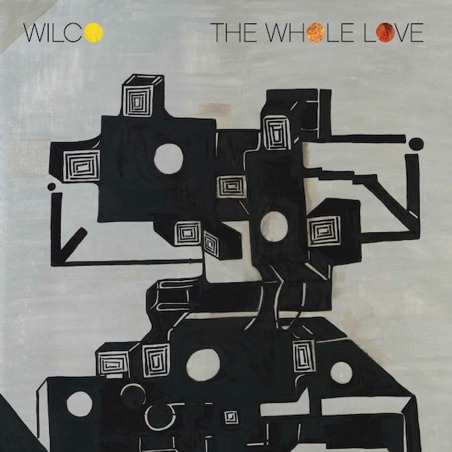

Wilco’s legacy has stemmed from the success of almost two decades worth of quality music -— most notably from the late 90s, early 00s era (see: Summerteeth and Yankee Hotel Foxtrot). Although their moment as a band has seemingly come and gone, it doesn’t stop Wilco from releasing music that reinforces their devoted fanbase and, at the same time, steadily expands it.
The Whole Love, Wilco’s eighth studio album since forming in 1994, possesses all the things that solidify their already capable sound while adding new flare. Familiar elements, such as frontman Jeff Tweedy’s straightforward lyrical approach and keen alt-country pop sense are combined with techniques that come out of nowhere.
The album’s opener, “The Art of Almost,” is a microcosm mix between the good old Wilco and the Wilco exploring new territory. Electronic blips hover through the seven-minute song, producing a pulsating rhythm seldom heard in previous songs. At the song’s culmination, guitarist Nels Cline busts out a heart-melting solo, attacking notes with a determined fervor. This style contrasts with the country twang listeners have come to expect.
Some bands who have stuck together long enough are often criticized for attempting to sound refreshing, but “Art of Almost” is not a song that you could chastise Wilco for. They sound completely within their own creativity, building upon sound instead of forcing themselves to be different. This is the key between a band that can withstand the test of time and one that cannot.
However, The Whole Love is not a radical adjustment in Wilco’s sound. The album’s second track, “I Might,” is a pop gem with a catchy bass line, punchy guitar part and Tweedy’s trademark crooning. They add some Doors-esque keyboards and produce a repeatable, radio worthy track. This song, along with other straightforward pop songs on the album (“Born Alone,” “Dawned On Me” and “Capitol City”) are more within Wilco’s established realm. Instead of tiredly repeating their formula, or entirely starting anew, Wilco is able to tweak their sound in a way that leaves listeners both satisfied and surprised.
There is a particular reason The Whole Love has a more cohesive sound than their 2009 effort, Wilco (The Album). In an interview conducted by www.avclub.com on Oct. 4, 2011, Tweedy said that Wilco has enough songs from their recording sessions to make two full-length albums, and that it’s “the most songs I’ve had going into a record since Being There [1996].” By having more songs to choose from, according to Tweedy, it “makes it easier to be less precious about them.”
Perhaps it’s due to Wilco’s tight-knit lineup translating into their music. After going through a schism in 2005, dropping many original band members (Tweedy and John Stirrat, Wilco’s bassist, are the only two founding members currently in the band) and picking up new musicians, Wilco has made three albums. The well-received Sky Blue Sky (2007) introduced a more refined, peculiar sound, and Wilco (The Album) seemed a bit rushed and underachieved. With The Whole Love, it’s a band that’s been together for six years rediscovering their sound.
When Wilco is in the groove, they’re at their best. “Born Alone” contains a shrilling guitar line that will embed itself in your head. “Capitol City,” the album’s newest single, has a dreamy dance tempo with Tweedy crying, “You wouldn’t like it here/ You should stay right there” over moaning keyboards. These are instances of brilliance that enhance Wilco’s already impressive song canon.
What makes this album good (but not great) is its inconsistency. That isn’t to say the songs aren’t listenable or generally ear-catching, but there are moments when they drag. The acoustic alt-country songs like “Open Mind” and “Rising Red Lung” feel flat at first listen and take a few tries to warm up to. The album closer, “One Sunday Morning (Song for Jane Smiley’s Boyfriend),” at first feels enchanting, but after spinning that album a few times the magic of that guitar melody diminishes.
As a whole, the album is a mix of songs that can be instantly repeated and others that are a toss-up between captivation and indifference. However, the ones that are hit-or-miss are definitely overpowered by the pop gems and even the songs that can sometimes drag contain spellbinding moments. For a band that’s been in the game for so long, it’s important to appreciate Wilco’s ability to be comfortable with themselves. After all, it’s not just about the listeners they make music for, it’s also supposed to be fun for them. It’s their evolving creative outflow that’s made them such a staple in the indie rock world for so long and, hopefully many years to follow.
3 stars
